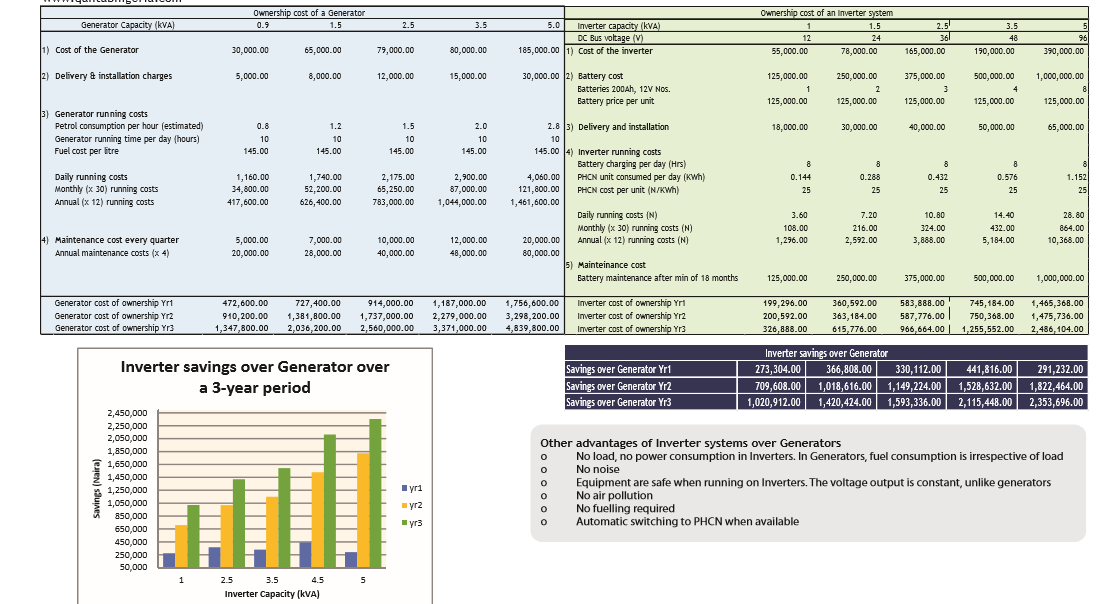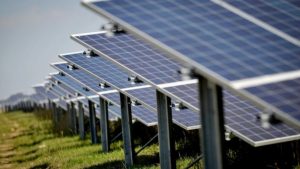Perhaps an unending grudge match, comparing inverters and fuel generators don’t always come easy, in retrospect however, there are reasons to make a choice from the two options. So, we ask you, how well do you know the economics of both alternatives? Have you considered their impacts on your pockets and health? Are you really being fooled or full on value? Findings from OGN’s random research on both could guide your choices especially for homes and small businesses.
Inverters may be cheaper than fuel generators and the days of fuel generators running noisily in households and small business premises all over Nigeria may be nearing its end or so, says the Director of Qantab Light Cube, Mr. Chukwuka Madumelu.
Madumelu, who runs an Abuja-based alternative energy solution company explained to OGN that though badly communicated over time, inverter systems have proven to give out better values to consumers than fossil fuel generating sets. His summations though were found faulty by Mike Ogunye, a Lagos-based petrol generator merchant.
Describing inverters as limited in offering, Ogunye, noted there were no basis for the comparisons. He also pointed to the cost of deploying inverter system and the instability of Nigeria’s grid electricity as reasons to fall back to fuel generators.
An inverter is a device which converts direct current (DC) into alternating current (AC). When connected to a battery or a number of batteries, it becomes an integrated system that stores electrical power when there is a power source feeding to it and discharges when there is no power. Therefore a person may charge an inverter system from the normal grid energy source, and then power his or her home appliances when the electricity goes out.
On the other hand, generators are alternating current (AC) power supplies that use fossil fuels as their main source of consumptive energy. Diesel, propane, and gasoline are mostly used to run the engine which spins a rotating shaft that uses magnets and electrical windings to create electrical AC current.
Down to the wires…
Making his comparisons, Madumelu, referred to the long-term cost implication of owing a generator of any size to an inverter of equal size, and informed that inverter owners could save as much as 45 to 60% annually of what they could spend running generators, if they charged and ran their inverters appropriately for the duration.
The Qantab director assessed, for instance, that a fuel powered generator of 0.9 kVA capacity would amount to N472, 600.00 per annum if run for 10 hours per day with the pump price of fuel at N145 per litre, while its counterpart inverter would gulp only about N199, 296.00 if charged for eight hour per day of use, in an entire year. This translates to about 43% in savings – a brow raising figure by any account.
When asked as to why people were not so keen on buying inverter sets if those devices were so convenient and cheaper than fuel generator sets, Madumelu insisted that ignorance from both government and private consumers about inverters’ cost, maintenance and operational features were the primary reasons people have relegated the potentially revolutionary system into the shadow of generators.
Other operators in the renewable energy industry have expressed their deep frustrations at the slow speed of publicizing information about the potentials of inverter systems.
One of such stakeholders – Suleiman Yusuf, CEO of Blue Carmel Energy, which is another renewable energy company based in Abuja, told OGN that Nigeria’s avoidance of simple yet reliable solar devices such as the solar heaters was hurting the economy of the country.
Yusuf, noted that as much as 20% of the electricity sent to homes or hotels in the country could be saved with solar heaters. He thus wondered why such solutions have not made their way up on rooftops of homes across the country.
However, Madumelu and Yusuf, believed the government could play a great role in making such transformation gain roots in the country through legislations on safe and cheaper power alternatives.
An impartial opinion…
Notwithstanding the arguments for both alternatives, an independent piece written by tech doctor, Don Wilson for Xantrex Technology, stated that one of the major drawbacks of a generator is that they can be terribly inefficient and waste a lot of fuel if they’re not used at full (or at least heavy) load for a long period of time.
“Generators can unnecessarily pollute the environment for a small benefit. For example, if you have a 7kW generator powering your 700W TV/DVD/Surround system, you waste fuel running that big engine for little benefit.
“On the other end of the spectrum, if you start your generator for the 10 minutes it takes to microwave last night’s leftovers, the generator barely gets lukewarm before you’ve shut it down. This can cause carbon buildup on the critical engine components, shortening the life of your generator’s engine. Lastly, generators are heavy and don’t surge very well,” said Wilson.
Turning to inverters, he said: “On the plus side inverters are extremely efficient, compared to generators, and only consume DC power in direct relation to the amount of power they put out. Another major benefit is that they are virtually silent compared to generators.
“However, inverters are not a perfect supply since their energy supplies (batteries) are permanently mounted, hard to replenish, and limited. This means that short-term heavy loads (like a microwave), or long-term lighter loads (like an entertainment center) are just right for an inverter with the right battery bank.”
So are there winners in this grudge match? Wilson said no, there are no clear-cut winners.
According to him: “Sure if there was a significant investment in solar panels, an inverter could easily take the place of a generator. This would require a huge initial cost, but the long-term cost of ownership would be less with a solar/battery/inverter system than a generator. While sunshine is free when it’s available, you can’t purchase it from a friendly neighborhood convenience store like fossil fuels.”
“Personally, I like the win-win scenario that favors both options in their respective corners of strength. Use the inverter to power anything it can, minus the ‘monster loads’ like air conditioners. Then when the batteries are depleted, or you need the monster loads to turn on, run that macho generator for a long time (at least an hour) to power the heavier loads, and let the battery charger then give the inverter its efficient power once you’re ready to shut the generator down,” he advised.






